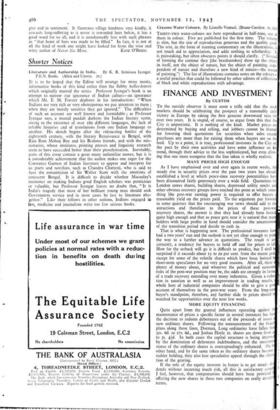Shorter Notices
Literature and Authorship in India. By K. R. Srinivasa Iyengar. P.E.N. Books. (Allen and Unwin. 2s.)
IT is to be hoped that the Editor will arrange for more meaty, informative books of this kind rather than the flabby belles-lent-es which originally marred the series. Professor Iyengar's book is an attempt to narrow our ignorance of Indian culture—an ignorance which Mr. E. M. Forster deplores in his introduction : " When Indians are very rich or very obstreperous we pay attention to them ; when they are merely sensitive they get ignored." The difficulties of such an account are well known and formidable ; as Professor Iyengar says, a mental purdah darkens the Indian literary scene, owing to the existence of over 58o different languages, the lack of reliable histories and of translations from one Indian language to another. His sketch begins after the exhausting battles of the eighteenth century, with the literary Renaissance in Bengal, with Raja Ram Mohan Roy and his Brahma friends, and with the mis- sionaries, whose institutes, printing presses and linguistic research seem to have succeeded better than their proselytisation. Inevitably, parts of this essay contain a great many unfamiliar names, but it is a considerable achievement that the author makes one eager for the Constance Garnett of Indian literature to appear and interpret for us poets and novelists, such as Chandra Chatterji, who is said to fuse the romanticism of Sir Walter Scott with the emotions of renascent Bengal. It is difficult to decide whether Macaulay's insistence on making Indians good English scholars was perniciOus or valuable, but Professor Iyengar leaves no doubt that, " It is India's tragedy that most of her brilliant young men should seek Government service and in most cases be lost to literature alto- gether." Like their fellows in other nations, Indians engaged in law, medicine and journalism write too few serious books.


























 Previous page
Previous page